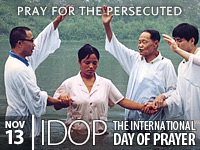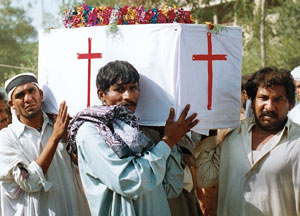 This Sunday, November 13, is the International Day of Prayer for the Persecuted Church, a global day of intercession for persecuted Christians worldwide. It’s a day to remember and pray for the hundreds of men, women, and children killed for Christ each day, ignored by the world but watched by the eyes of heaven—those of whom the world is not worthy. (You can listen to my 49-minute message on the persecuted church, “Those of Whom the World Is Not Worthy.”)
This Sunday, November 13, is the International Day of Prayer for the Persecuted Church, a global day of intercession for persecuted Christians worldwide. It’s a day to remember and pray for the hundreds of men, women, and children killed for Christ each day, ignored by the world but watched by the eyes of heaven—those of whom the world is not worthy. (You can listen to my 49-minute message on the persecuted church, “Those of Whom the World Is Not Worthy.”)
In If God Is Good, I tell the story of Graham Staines, who left his home in Australia to minister to lepers in India for thirty-four years. He and his wife, Gladys, served Christ by serving the poorest of the poor.
 At midnight on January 23, 1999—a year and a half before my wife, daughters, and I met Gladys and her daughter, Esther—a mob of militant Hindus murdered Graham and his two sons, Phillip, age eleven, and Timothy, age six. The killers invaded a Christian camp in the jungle, where Graham had ministered, and set fire to the Jeep in which Graham and his sons slept. When the fire finally cooled, believers found the charred body of Graham Staines with his arms around the bodies of his sons.
At midnight on January 23, 1999—a year and a half before my wife, daughters, and I met Gladys and her daughter, Esther—a mob of militant Hindus murdered Graham and his two sons, Phillip, age eleven, and Timothy, age six. The killers invaded a Christian camp in the jungle, where Graham had ministered, and set fire to the Jeep in which Graham and his sons slept. When the fire finally cooled, believers found the charred body of Graham Staines with his arms around the bodies of his sons.
In the most appalling way, Gladys and Esther found themselves alone. Their response to the tragedy appeared on the front page of every newspaper in India.
“I have only one message for the people of India,” Gladys said. “I’m not bitter. Neither am I angry. But I have one great desire: That each citizen of this country should establish a personal relationship with Jesus Christ who gave his life for their sins.... Let us burn hatred and spread the flame of Christ’s love.”
When asked how she felt about the murder of her dad, thirteen-year-old Esther said (in words that sound straight off the pages of the book of Acts), “I praise the Lord that He found my father worthy to die for Him.”
 Gladys stunned a nation by saying that God had called her and Esther to stay in India for that season. “My husband and our children have sacrificed their lives for this nation; India is my home. I hope to be here and continue to serve the needy.”
Gladys stunned a nation by saying that God had called her and Esther to stay in India for that season. “My husband and our children have sacrificed their lives for this nation; India is my home. I hope to be here and continue to serve the needy.”
At the funeral, masses of people filled the streets—Hindus, Muslims, and Christians. They came to show respect for the Staines family and demonstrate solidarity against the killers. Although persecution of Christians had recently increased, the president of India stated, “That someone who spent years caring for patients of leprosy, instead of being thanked and appreciated as a role model should be done to death in this manner is... a crime that belongs to the world’s inventory of black deeds.”
At the conference where we met them, after Gladys and Esther spoke, an Indian national leader told us about the impact of their response to the murders. He said the people of India asked, “Why would a man leave his wealthy country and serve lepers in India for thirty-four years? Why would his wife and daughter forgive the killers of their family? Why would they choose to stay and serve the poor? Who is this God they believe in? Could it be that all we’ve been told about Christians has been lies? Could it be that Jesus really is the truth?” He stated that many Hindus had come to Christ through their witness.
The Staines carried on a long tradition of God’s people: “Others were tortured and refused to be released, so that they might gain a better resurrection. Some faced jeers and flogging, while still others were chained and put in prison. They were stoned; they were sawed in two; they were put to death by the sword. They went about in sheepskins and goatskins, destitute, persecuted and mistreated—the world was not worthy of them” (Hebrews 11:35–38).
 Christ made it clear that to persecute his people is to persecute him. Whatever others do to his people, positively or negatively, he regards as being done to him (see Matthew 25:40, 45). Christ no longer suffers on the cross, but he suffers with his suffering people.
Christ made it clear that to persecute his people is to persecute him. Whatever others do to his people, positively or negatively, he regards as being done to him (see Matthew 25:40, 45). Christ no longer suffers on the cross, but he suffers with his suffering people.
After his ascension, Jesus says to the Pharisee on the Damascus road, “Saul, Saul why do you persecute me?” (Acts 9:4). Persecution, of course, entails suffering. One verse later Christ says to Saul, “I am Jesus, whom you are persecuting.” Note the present tense—although Christ’s atoning sacrifice occurred in the past, he continues to identify with and participate in his people’s suffering until he returns to end all suffering.
Thank you, King Jesus, for your loyalty to us and to every one of our suffering brothers and sisters. Thank you for promising a kingdom where righteousness will reign and joy will be the air we breathe. May that kingdom come quickly—and until it does, may you find us faithful.





